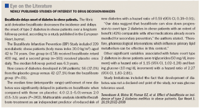- Safety & Recalls
- Regulatory Updates
- Drug Coverage
- COPD
- Cardiovascular
- Obstetrics-Gynecology & Women's Health
- Ophthalmology
- Clinical Pharmacology
- Pediatrics
- Urology
- Pharmacy
- Idiopathic Pulmonary Fibrosis
- Diabetes and Endocrinology
- Allergy, Immunology, and ENT
- Musculoskeletal/Rheumatology
- Respiratory
- Psychiatry and Behavioral Health
- Dermatology
- Oncology
Intensive control of type 1 diabetes results in fewer cardiovascular events over the long term
Tight glucose control for a mean period of 6.5 years produces long-lasting cardiovascular benefits in patients with type 1 diabetes, according to a study published in the New England Journal of Medicine (NEJM).

According to the Diabetes Control and Complications Trial (DCCT), intensive blood glucose control for a mean of 6.5 years followed by less intensive control for the next decade reduced the risk of cardiovascular events over nearly 2 decades of follow-up.
In the study, 1,441 patients aged 13 to 40 years with type 1 diabetes were randomized to intensive management of blood glucose or conventional control. Those randomly assigned to intensive control used 3 or more daily insulin injections or an external insulin pump guided by self-monitoring of blood glucose at least 4 times daily to achieve average HbA1c levels as close as possible to 6% or less. Conventional treatment consisted of 1 or 2 insulin injections per day with daily urine or blood glucose testing. The randomized portion of the trial lasted from 1983 to 1989.
During the 6-year study period, the incidence of cardiovascular events was lower in the intensively treated group than in the control group (31 vs 52, respectively), but the total number of events was too few to draw any meaningful conclusions.
In the 11-year follow-up to DCCT, known as the Epidemiology of Diabetes Interventions and Complications (EDIC) study, the difference in HbA1c levels between the treatment groups dissipated when the participants were returned to their primary healthcare providers for diabetes care. By the end of the EDIC follow-up, the difference in HbA1c levels between the 2 groups was no longer significant.
Despite this narrowing in the difference of HbA1c levels, the benefits of the original 6 years of intensive control persisted during the mean follow-up period of 17 years.
The long-lasting value of intensive control was evident in the difference in number of cardiovascular events between the 2 groups over the full follow-up. Patients randomized to intensive treatment had 57% fewer such events compared with the patients assigned to conventional treatment (46 vs 98, respectively). Thirty-one intensively treated patients and 52 conventionally treated ones had at least 1 cardiovascular event during the 17 years of follow-up.
The rate of cardiovascular events per 100 patient-years was 0.38 in the intensively treated group and 0.80 in the conventionally treated group (P=.007). The cumulative rate of cardiovascular events was 6% in the intensively treated group and 11% in the control group, which corresponded to a 42% risk reduction with intensive treatment (95% CI, 9%–63%; P=.002).
A history of microalbuminuria more than doubled the risk of cardiovascular disease (HR=2.93; 95% CI, 1.85–4.65; P<.001) as did a history of albuminuria (HR=2.57; 95% CI, 1.36–4.88; P=.009). Adjusting for the difference in microalbuminuria (HR=0.62; 95% CI, 0.39–0.97; P=.04) and albuminuria (HR=0.58; 95% CI, 0.37–0.91; P=.02) between the 2 treatment groups explained only a small portion of the treatment effect, most of which was attributed to the intensive insulin therapy, according to the authors.
They hypothesized that the same glycemic mechanisms responsible for a reduction in microvascular disease also may apply to the development of atherosclerosis and resultant cardiovascular disease. "Alternatively, the beneficial effect of intensive therapy on the risk of cardiovascular disease may be a result of the reduction in the incidence of microvascular disease," they stated.
The co-chairmen of the DCCT are Saul Genuth, MD, and David Nathan, MD, director of the general clinical research center at Massachusetts General Hospital, and professor of medicine at Harvard Medical School, Boston, Mass.
In an editorial accompanying the article, William T. Cefalu, MD, chief, division of nutrition and chronic disease, Pennington Biomedical Research Center, Louisiana State University, Baton Rouge, La, pointed out the DCCT/EDIC results may call into question HbA1c goals currently recommended for children: less than 8.0% for those aged 6 to 12 years, and less than 7.5% for those aged 13 to 19 years.
"Data suggest that atherosclerosis begins early in patients with type 1 diabetes and that the progression of cardiovascular disease is much more aggressive in this group," Dr Cefalu stated. Achieving these aggressive HbA1c goals in children would be difficult, he said.
SOURCE: The Diabetes Control and Complications Trial/Epidemiology of Diabetes Interventions and Complications (DCCT/EDIC) Study Research Group. Intensive diabetes treatment and cardiovascular disease in patients with type 1 diabetes. N Engl J Med. 2005;353:2643–2653.
Cefalu WT. Glycemic control and cardiovascular disease-should we reassess clinical goals? N Engl J Med. 2005;353:2707–2709.
